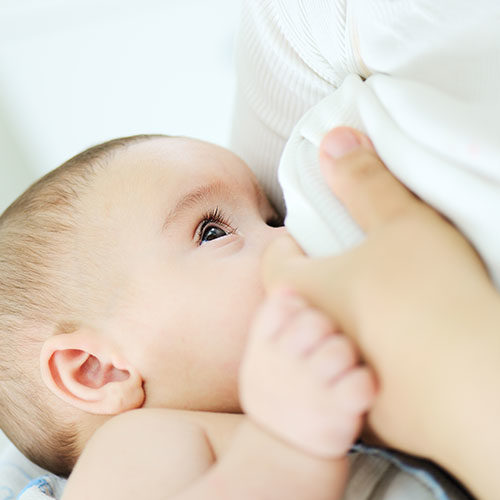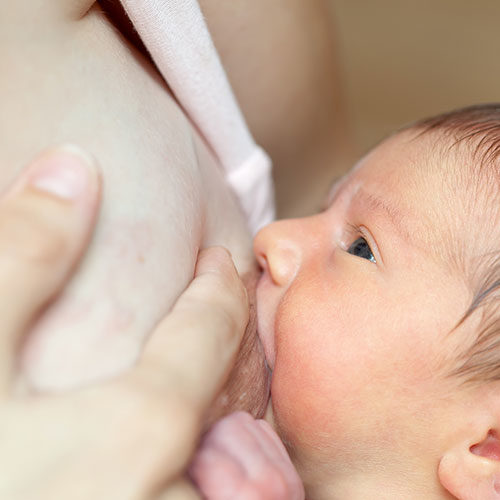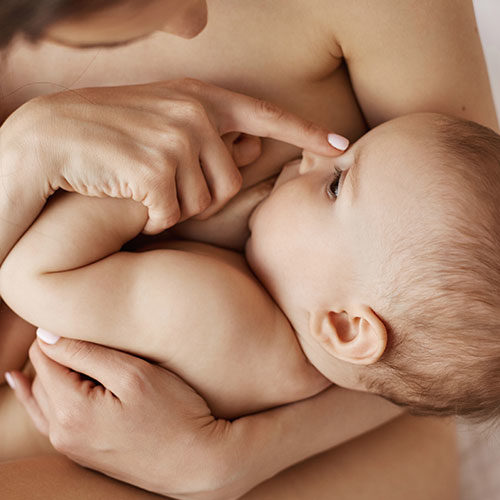Even though hungry my baby won't breastfeed and is distracted by the surrounding, What's happening?
Around the age of 4-5 months, an ever so focussed and dedicated nursling is suddenly pulling away from breast way too often and looks more interested in everything other than the mother’s breast while nursing.
What is happening….?
This is the distraction phase. As the baby grows up and has better developed sensory organs along with more body-control; her awareness of her surroundings explodes and curiosity kicks in! The baby becomes extremely interested in observing and exploring her surroundings and gets easily distracted by the slightest of stimuli. Everything is new and exciting for her and she’s too distracted to breastfeed!
This is normal; and in fact, a good sign showing that the baby’s brain is developing well. The baby is curious and wants to know what is happening and she wants to make sense of it. This is the stage wherein she has to see and look at things to understand what is happening. As she grows more, she will not have to turn away from the breast to understand what’s happening. She’ll be able to understand by the sounds, light variations, temperature changes, smells etc. But until she reaches that stage, she will pull away from the breast to see and look and observe and analyse and understand and wonder and develop.
How to breastfeed a distracted baby?
It can be challenging to nurse a baby who keeps pulling off the breast all the time to look at other things. It can be frustrating too. The important thing to remember here is that this is a baby less than 6 months old and her only food is breast milk. So, it is important to ensure that the baby’s intake does not suffer. Here are certain things that the mother could do.
- Nurse the baby in a dark, quiet, boring room, free of distractions.
- Give the baby a favourite or an interesting toy to hold in her hand while nursing. This can keep the baby from getting distracted elsewhere.
- Another idea to keep the baby busy at the breast is for the mother to wear a sparkly, colourful neckpiece which the baby can hold and play with while nursing.
- Nursing lying down could make the baby sleepy and less distracted.
- Football hold can let the mother have better control over the baby’s head. It can be useful when the baby turns her head in a hurry and forgets to unlatch before.
- Don’t resist the reverse cycle nursing at this point. The reverse cycle is when the baby nurses much more during the night to make up for the lost nursing sessions during the day. This is a good way to ensure a good intake. Dream-feeding is another good option.
- During the day, nursing while the baby is sleepy or when the baby is just waking up should meet with minimum distractions.
- If the mother is going to be away from the baby for a while, it would make sense to nurse the baby well (by eliminating distractions) before leaving so that the baby doesn’t feel hungry soon again.
- It is also important to remember that at this age, babies are more efficient at nursing as compared to newborn days. So, even in distracting short sessions, the baby may be drinking to her needs. However, there is no harm in keeping a check on the wet nappy count, just to be sure.
- Nursing a distractible baby while travelling or out in public could be challenging
* A baby carrier or a nursing cover can provide a distraction-free zone to the baby.
* If the baby is older than 6 months old and is on solids, she may be more willing to eat some healthy snacks in a distracting situation as opposed to breastfeeding.
Is the baby weaning?
When the distraction phase continues or comes back around 8-10 months of age, as it often does, many mothers wonder if their baby is self-weaning. It is very rare for a baby to self-wean at this age. All the baby needs to breastfeed well is – fewer distractions. The strategies mentioned above can help. Reverse cycle nursing at this stage can be extremely important. Around one-fourth of the baby’s milk needs are met by night-nursing. It is one of the reasons why night weaning is not recommended at this age.
References :
https://kellymom.com/ages/older-infant/distractible-baby/
https://lllusa.org/breastfeeding-your-distracted-baby/
https://www.lllc.ca/thursdays-tip-breastfeeding-distracted-baby-6-12-months
https://www.sdbfc.com/blog/2015/4/8/breastfeeding-at-3-4-months-it-can-look-very-different
Wish to speak with a member of our team who is a certified lactation professional and also an experienced breastfeeding mother, click on this link.
Medical Advice Disclaimer
THIS WEBSITE DOES NOT PROVIDE MEDICAL ADVICE.
The information, including but not limited to, text, graphics, images and other material contained on this website are for informational purposes only. No material on this site is intended to be a substitute for professional medical advice, diagnosis or treatment. Always seek the advice of your physician or other qualified health care provider with any questions you may have regarding a medical condition or treatment before undertaking a new health care regimen, and never disregard professional medical advice or delay in seeking it because of something you have read on this website.
Disclaimer
We understand and acknowledge that parents and babies can be of various genders on a spectrum of LGBTQI+. Families come in diverse flavours. However, in our articles, for the sake of simplicity and convenience, we will be referring to the breastfeeding parent as the mother and using the female pronouns- ‘she’ and ‘her’ for babies. Babies can be nourished and nurtured in different ways and while we have used the terms breastfeeding and nursing, we recognize that parents can opt to chest feed or finger feed.
We don’t have conflicts of interest and declare, and we are compliant with the WHO code of marketing of breastmilk substitutes and the IMS act.
In case you find any information on this website that needs to be updated, please write to us at info@bsim.org.in






